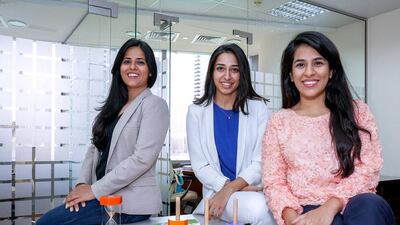DUBAI // Young adults with special needs and their parents are looking forward to the opening of the first centre in the emirate that caters for their needs.
They said there were few facilities for disabled people aged 16 to 25 in Dubai.
Integreat Centre was founded by Indian expatriates Kiran Thakur, Nikita Patel and Ayukta Thakur.
The trio said that after waiting nine months for approval from the Ministry of Community Development, they were excited about the opening of the centre.
Poonam Rai, an Indian, who has a 22-year old son with autism, said: “It is very important to have a centre in Dubai for adults with special needs as that will regularise their life pattern and will give them the opportunity to interact with others to help their social skills. As parents, siblings, and family, it can be very challenging.”
Gulshan Kavarana has a 19-year-old daughter, Zara, who was diagnosed with Dravet Syndrome, a rare genetic condition.
“I have been in Dubai for 20 years. When I first moved, there were centres for children with special needs that had a policy for ‘graduating’ young adults as soon as they turned 18,” she said. “Only five or six years ago people realised there was a niche for the recently graduated adults with special needs.”
The increase in the population of Dubai has meant more demand for special needs services, she said.
“There are very few centres catering to the needs of the adults in our community,” said Ms Kavanara.
“We do need more facilities, especially for the moderate to low functioning adults as there is nothing happening for them.”
Integreat Centre will be offering teaching in life skills development for higher-functioning students and a personal enrichment programme for lower-functioning students.
Ms Thakur, co-founder and head of education development at Integreat Centre, said: “We look at social skills, communication skills and cognitive ability, so students who have a higher functioning can be taught for example about basic social sciences or mathematics or body parts.”
For lower-functioning students, the educators will be working to develop skills such as how to introduce themselves or maintain eye contact. The focus is on developing their social, domestic skills and functioning life skills.
Higher-functioning students will learn how to take the Metro or call an Uber taxi. They will practise these skills.
Educators have developed the curriculum based on resources from the UK, United States and Canada.
“While children have been going to school, there are some things that other people are doing for them,” said Ms Thakur, who has taught special needs children in Dubai.
“Early intervention is a new concept in Dubai. Basic skills need to be taught. Earlier there was no emphasis on these skills and thus this is the age group we are catering to,” she said.
“There is a lot of emphasis on academics but people forgot about these skills that are so important,”
Ms Ayukta said that many expatriates who have children with special needs move back home as there were limited opportunities in Dubai for them.
“Many people wanted options for their children. What is available is that only students until the age of 18 are accepted in schools. They have some recreation centres in Dubai but there is nothing focusing on the age range from 16 to 25,” she said.
arizvi2@thenational.ae


